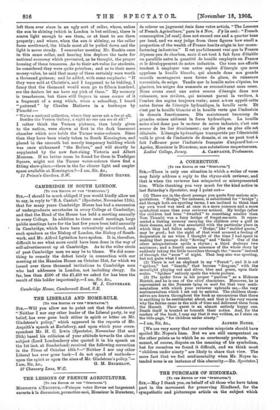A CORRECTION.
[To THE EDITOR 07 THE " SPECTATOR:] Sin,—There is only one situation in which a writer of verse may fairly address a reply to the rhyme-sick reviewer, and that is when the reviewer has misquoted or misrepresented him. While thanking you very much for the kind notice in last Saturday's Spectator, may I point out— (1) There are in the short passage you quote four serious mis- quotations. "Hedge," for instance, is substituted for " bridge"; and though both are sporting terms, I am inclined to think that my own word was used at once in a more common and a more symbolical sense than your reviewer noticed. My bridge (after the children had been "dwarfed" to something smaller than Tom Thumb) was a fairy bridge of forget-me-nots. It repre- sented a linking memory carrying the children over a gulf in their dreams, and it was associated with the particular place in which they had fallen asleep. "Hedge," like " mobled queen," may be good; but the sight of that word aroused a feeling of desperation in me when I thought of the time I had spent in making that passage duly "flowing" and "facile." One of the other misquotations spoils a rhyme ; a third destroys two sentences ; and a fourth makes nonsense of the whole story by suddenly taking the little travellers through the "moon" instead of through the "noon" of night. That leap also was sporting, but not quite what I meant.
(2) There is not an elephant in my "Forest"; and it is not "spiders." but "lizards," that become "dragons," with the moonlight playing red and silver, blue and green, upon their scales. "Spiders" entirely spoils the whole picture.
(3) The spider lives in his proper " parlour " as a Hideous Hermit, and he is one of the chief characters. Moreover, he is represented as the Nemesis lying in wait for that very senti- mentalism with which your reviewer upbraids me,—the very sentimentalism which I set out to satirise. The children them- selves are drawn throughout the book as unconscious that there is anything to be sentimental about, and that is the very reason why the fairies came in the nick of time and delivered them from the Hermit. Their quest is an almost entirely happy one. Death itself is treated as beneath their notice. And, for the readers of the book, I may say that it was written, as I state on the title-page, "for children under ninety."
[We are very sorry that our careless misprints should have spoiled Mr. Noyes's lines. But we are still unrepentant on the other points as to which he so courteously protests. We cannot, of course, dispute on the meaning of his symbolism, but for ourselves we found it difficult, and we think most "children under ninety" are likely to share that view. The mere fact that we feel sentimentality when Mr. Noyes in-
tended none is an instance of this obscurity.—En. Spectator.1


































































 Previous page
Previous page